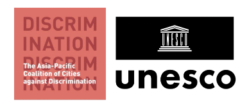city art-lab
introduction
Art Lab is a laboratory of artistic interventions, which highlights the social role of artists in processes of memory and reconciliation, and, hence, in promoting human rights, dignity and artistic freedom. The arts have proven to be a powerful tool in supporting reconciliation, rehabilitation, and reintegration. For instance, in the Central African Republic, SGBV (sexual and gender-based violence) decreased from 76% to 16% in the Mole refugee camp after four months of dance workshops with the Refugees on the Move programme (African Artists for Development) in 2016. Many narrative reports highlight the transformative power of art when working with populations living under continuous stress. Launched in partnership with the National Theatre of Chaillot in Paris on 10 December 2018, Art-Lab is a space that enables wide community engagement on a range of social issues. Engaged artists promote concepts of inclusion, justice and social cohesion through inclusive performance, design and dialogue.
Cities are the main global hosts for arts venues and activities including theatres, museums and other public spaces. The Art-Lab concept uses arts practice with the most vulnerable for human dignity and rights, and social inclusion. This can both be through the process of creation itself involving community as partners in creation, and through the presentation of art. Bringing together city authorities, artists and community to co-design and participate in artistic activities can explore local issues and develop local solutions owned by the community.
At the World Human Rights Cities Forum 2021, a discussion panel on Cities Art-Lab explored this concept with case studies on the many different ways in which the practice of arts can promote human rights and social cohesion. In 2022 APCAD will establish a pilot project bringing together cities, artists and community to design a collaborative project to demonstrate this in practice.
